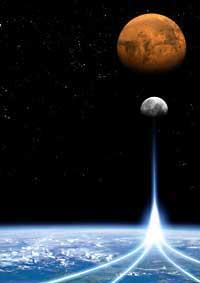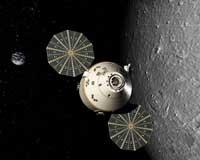To the moon

Both of them present both interrelated objectives; the Moon is, to some extent, the training to reach Mars. To a certain extent, it cannot be forgotten that one of the obstacles for man to reach Mars is man himself, among others, for the damage that weightlessness produces to astronauts. Traveling to the Moon is a matter of days, but only to go to Mars it takes six months today.
However, for Americans, the Moon is also a destination: Placing a permanent base on the Moon is one of the main challenges of the Vision for Space Exploration project presented in 2004. A base on the Moon, for what? To explore the Moon, to investigate the solar system from the Moon (an ancestral idea is to put a telescope on the hidden face of the Moon), perhaps to send missions from the Moon to other planets (if everything necessary for a space mission were to be prepared on the Moon itself, from the point of view of gravity it would be much easier to escape the attraction of the Moon than of the Earth's gravity, taking into account that the energy of the gravity of the gravity of the rocket. But given that to be worthwhile, materials and energy should be obtained right there, it is not clear whether this type of use can never be given to the Moon.
To justify this type of projects highlight their scientific and technological contributions. But in this case, at least in the case of the Moon, it seems that most are skeptical. In addition, one of the criticisms made to the new NASA Vision is that it has little innovation; that the proposals are very similar to the Apollo capsules that were used 40 years ago to reach the Moon for the first time; that we were before a déjà vu.
In the field of social protection, apathy triumphs. According to a survey published in September last year, there does not seem to be too much passion to return to the Moon. Much less to go to Mars. The data come from the United States, but being the exploration and leadership of new worlds one of the symbols of their national identity, it is possible to think that here the results would be worse (I would be surprised if not).

The lack of interest is especially evident among young people aged 18 to 25 who will fund this NASA vision for 40 years. Specifically, only half of the young people who participated in the survey knew about the Vision for Space Exploration project. And as for the return to the Moon, two out of three was equal or not interested. With Mars, four out of five had the same posture.
Lack of interest is not limited to manned travel. The space's research program itself has increasingly contras: In 2004, 55% of youth supported and compared to 30%. In 2006 the two positions were much more balanced: 45% in favor, 40% against.
If you enter the web pages of these projects of exploration of the Moon, Mars and others beyond, you will see that one of the goals that are cited is to excite and interest young people. But it does not seem that reality coincides with his vision. Human
the future of civilization (and also survival) is of the solar system
the promoters of these programs see it in plorization and colonization. The recipients, for their part, have more interest in space tourism. For a third of the youth who participated in the survey, NASA was not important in their life. Space tourism, on the other hand, yes, because they say that normal people can reach space.Published in Berria.
Buletina
Bidali zure helbide elektronikoa eta jaso asteroko buletina zure sarrera-ontzian











